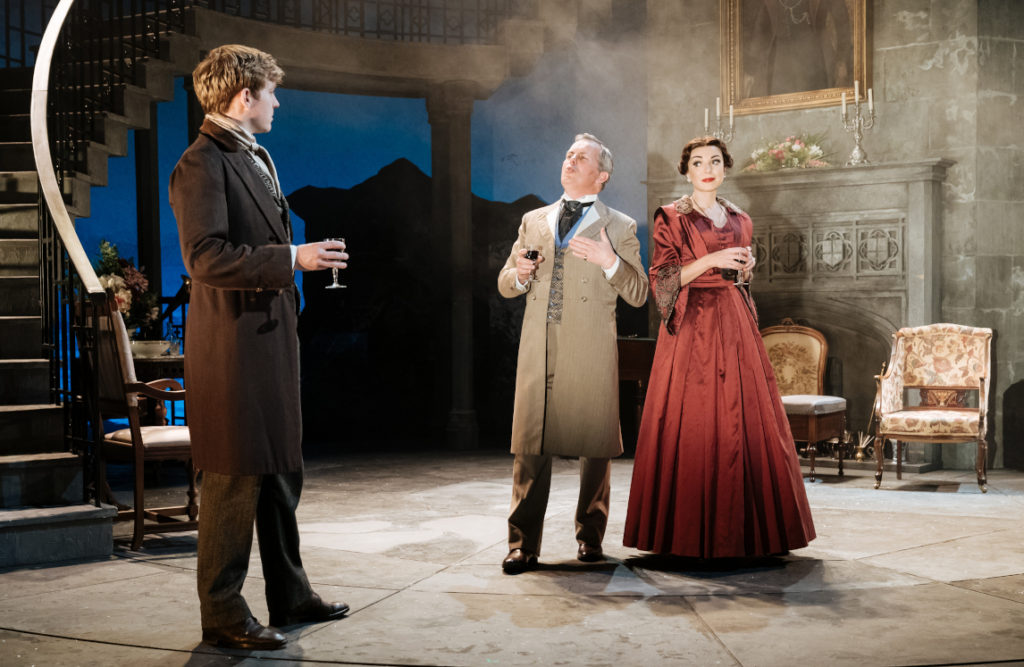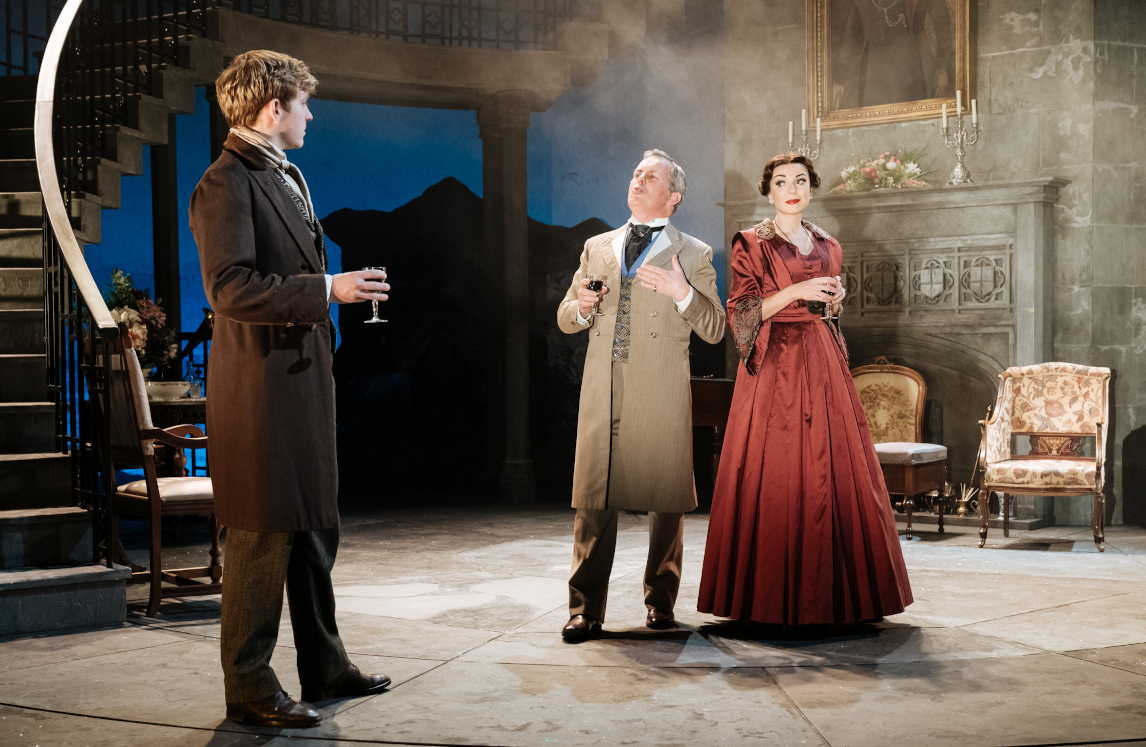
Directed by Anthony Banks, this adaptation of Daphne du Maurier’s popular mystery-romance is visually splendid. Richard Kent’s set design is very impressive, featuring an enormous open staircase that curves snake-like up into darkness. There is a huge fireplace, topped by a grey stone chimney-breast upon which is hung a portrait of Ambrose Ashley, owner of this great Cornish country house and its surrounding estate. Later, the set will revolve, and the upper reaches of the staircase will become the nearby clifftop. Lighting designer David Plater makes effective use of flickering candlelight, and sound designer and composer Max Pappenheim has created suitably ominous sounds that serve to underpin a sense that danger is in the air. Set, lighting and sound all serve to create a darkly brooding, Gothic mood.
We meet orphaned 24-year-old Philip Ashley, who is devastated to learn that his cousin and guardian Ambrose has died in Italy, apparently from a brain tumour. While in Italy, Ambrose had married a cousin called Rachel, the widowed Contessa Sangaletti, and she is to visit the Ashley estate. In the months before his death Ambrose had sent letters depicting Rachel as a malicious money-grabber. Are his accusations the paranoid delusions of a sick man, or is Rachel someone genuinely to be feared? Had she poisoned her previous husband, and Ambrose, too? Philip has been raised in an all-male household, he has no experience of women, and he is deeply suspicious of Rachel. When she arrives, Philip finds that she is very beautiful, but he greets her with frosty animosity. Rachel is all too aware that he hates her.
Not without secrets and complexities in her own private life, Du Maurier was highly skilled at depicting relationships characterised by unspoken desires and dark suspicions. Her novel My Cousin Rachel is shot through with sexual tension. Although many features of this production seek to create an appropriate mood of dark eroticism, it is not always successfully sustained. It is essential that Rachel should be alluring, but also very ambiguous and mysterious. Helen George’s Rachel is certainly attractive, but there isn’t enough of the sheer ‘otherness’, the exoticism that this character requires. She should be seen as at least partly responsible for the suspicions that she arouses, but this Rachel is too knowable, too straightforward.
Jack Holden successfully portrays Philip’s youthful admiration and love for his late guardian, but his hostility towards Rachel lacks real bite. Philip should be truly misogynistic, but here he seems to be merely petulant. Last night’s audience found many of his prejudiced comments comic. His change in attitude towards Rachel does not really convince, for it comes too suddenly, and there has been little evidence that he has been harbouring any repressed liking for her beforehand. Eventually she seduces him on his birthday. This scene should surely focus upon the idea that Philip has undergone a profoundly significant sexual awakening, but the mood swiftly becomes comic, and much fun is had with the idea that their night of passion has caused them to miss his servants’ celebrations, including a firework display. The tone established here would be more suited to a rom-com, and any sense of real passion is dissipated.
The second half features a carefully choreographed Christmas scene, where all of the Ashley household carry candles, and snow falls prettily in the background. In some ways this scene exemplifies both the very real strengths and the weaknesses of this production. It is lovely to look at, but its sentimentality jars, and it certainly does not ring true for early nineteenth century Cornwall, not least because they sing In The Bleak Midwinter in a version not published until 1911.
I would have liked play to have been far darker, to have had a greater sense of danger. But despite its uncertainties of mood, this production of My Cousin Rachel offers much to enjoy. It has very high production values, it tells a fascinating story, and there are some excellent performances in minor roles. Sean Murray is splendidly rustic as Philip’s lively old servant John Seecombe, and Christopher Hollis brings a welcome touch of Mediterranean colour to his portrayal of the flirtatious Italian lawyer, Rainaldi. Aruhan Galieva is particularly touching as Louise Kendall, Philip’s long-time admirer who is sadly resigned to the knowledge that he will always see her as a good friend, but never as a lover. There is a subtlety in her performance that make her relatively brief appearances memorable. ★★★☆☆ Mike Whitton 20th November 2019
Photo by Manuel Harlan


